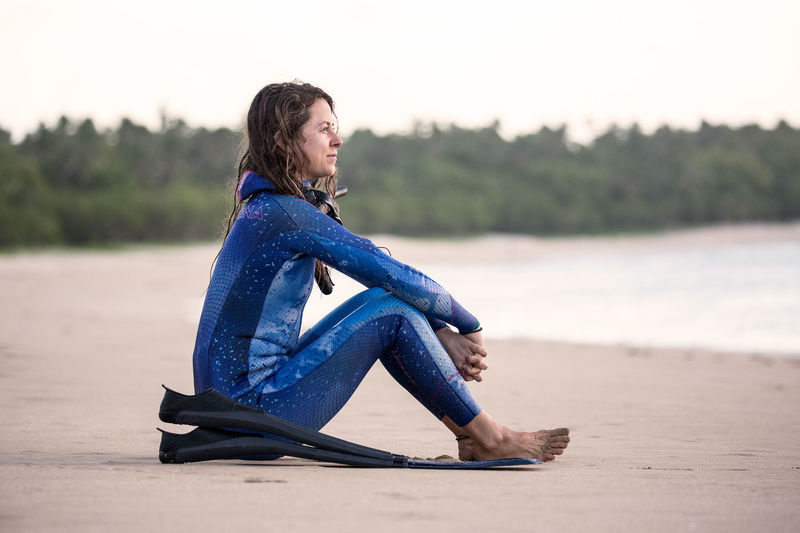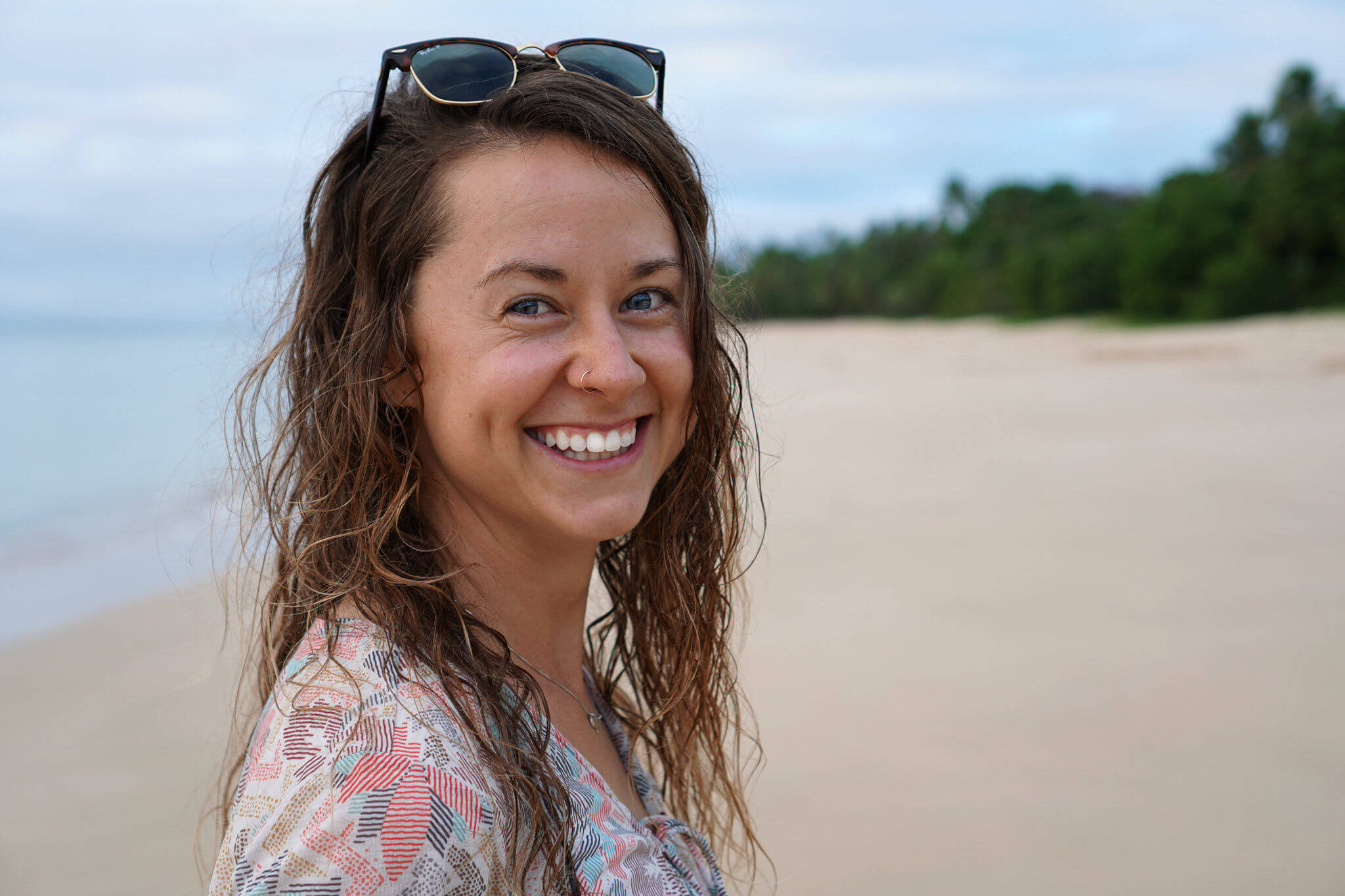 Fritz on the beach in Tonga. Courtesy photo
Fritz on the beach in Tonga. Courtesy photo
While most of her classmates were moving to cities like Chicago or New York after commencement, Lauren Fritz ’14 moved to Maui. On Hawaii’s second-largest island, the Idaho native began a career as a marine conservationist and ocean guide — an unusual path that, most recently, landed her in the South Pacific nation of Tonga for a job leading humpback-whale swim tours. Along the way, Fritz has documented her ocean-loving lifestyle and dispenses green living advice through her blog, The Greenest Blue. For our latest young alumni Questionnaire, the globe-trotter told us a bit about her aquatic life.
As a guide, activist and writer, you wear many hats. How exactly would you describe your career?
I think the easiest way to describe what I do is to say that I spend the majority of my time on the water as a marine ecotourism guide — whale watching, dolphin and whale swim tours — with a healthy dose of freelance writing and content creation on the side. I typically work two jobs each year based on the busy tourist seasons. For example, this past December through May, I was working in New Zealand for the summer as a dolphin swim guide. That season ends once the weather cools down, and I was able to find a job in Tonga for the winter as a humpback-whale swim guide. These jobs provide me with a bit of stability, but I also enjoy the flexibility that writing and content creation allows me; I can basically work from anywhere. I’m typing this up right now from a remote island in the South Pacific — fingers crossed the Wi-Fi works well enough for me to send it!
What are the best and worst parts of your multicontinental lifestyle?
Moving internationally so frequently is a thrilling experience, and I recognize it as a blessing. I feel nothing but gratitude for the experiences I have had and am able to create by immersing myself in new cultures and ecosystems. However, it is also a bit exhausting at times. I’m constantly having to cram my life into small suitcases, buy and sell cars each time I move, and reestablish a sense of community in each new home. I’ve certainly gotten better at minimalist packing and making new friends, but I am definitely not perfect.
After this season in Tonga, I’d love to do some traveling through Fiji and around the North Island of New Zealand. The beautiful thing about seasonal work is that, even though during the season you’re quite busy, you get the shoulder season off to travel or go visit family without having to beg your boss for time off. It’s just built into the lifestyle. I’ve taken anywhere from two weeks to two months off for a shoulder season and have enjoyed some amazing (and necessary) rest and recovery because of it.
What drew you to marine conservation as a career, particularly coming from the very landlocked University of Notre Dame?
I definitely stumbled and fell headfirst into marine conservation as a career while I was at a dead sprint in another direction, rather than actually choosing it. It’s wonderful how life takes you down those random roads sometimes!
I was very confused about what I wanted to study when I was at Notre Dame, but I loved that the liberal arts education there could prepare me for a variety of life paths. I picked a major of chemical engineering as a practical challenge and to keep my options open, but I eventually realized that a sense of outdoor, hiking or ocean culture was what I craved.
I spent the fall of my junior year abroad in Australia, and the following summer (with generous help from the Institute for Scholarship in the Liberal Arts, the College of Science and the Career Center) I completed an internship in South Africa with a conservation and ecotourism company that took guests cage-diving with great white sharks and studied the local shark population. That really sparked my interest in the ocean, while also giving me the relevant experience working on the water that I needed to land my first job in Maui. The ocean has been a regular part of my life ever since — I never want to stop exploring and working to save this salty wonderland.
 Lauren Fritz '14
Lauren Fritz '14
What would be your advice to someone who has an interest in a nontraditional or international career path like yours, but is afraid to take the leap?
You have nothing to lose, so why not try? Too often, we are our own worst enemies and we create all sorts of limitations for ourselves in our mind. I believe listening to our gut is the best thing we can do for happiness and sense of personal fulfillment, so if you have a drive to do something other than what you’re doing right now, listen to that beat! If you’re afraid of breaking into a nontraditional lifestyle, or trying for a new job, or just quitting and traveling for a bit, just think about what’s scarier: taking the leap, or not taking the leap and living the rest of your life wondering what that could’ve been? Have some faith in yourself and the process of life’s journey and know that you are completely loved and supported. Just leap.
Finally, what are your top tips for eco-friendly living?
Living green becomes a lot less complicated and difficult when you find your why. Why do you want to live green? Is it because you love surfing? Do you hike every weekend? Do you want to take your kids to all of the National Parks one day? Find your why and the steps to living green fall into place because you have something to act for.
Once you’ve got your why, my top tips for anyone wanting to make a green shift in their day-to-day life are right here:
1. Take an active interest in what you eat and where your food comes from. Limiting your animal product consumption significantly lowers your carbon footprint, but so does shopping locally if you do choose to buy meat, fish, eggs, and dairy. Eat mindfully. Shop locally.
2. Keep an eco-preparedness kit in your purse, car, or backpack and take it with you when you travel. I always have my Hydroflask, coffee canteen, and little bamboo utensil kit with me so I don’t need to opt for the single-use versions if I get a drink or meal out. I also take a Tupperware container with me in case I have leftovers to stash. Get creative with how you can reduce your waste.
3. Move your body more and give your mind time to breathe. This might seem like a weird way to “live green,” but when you exercise and practice mindfulness, you tend to have a more open mind, and you see things more clearly, giving you a stronger focus on your why. You can also lessen your carbon emissions by biking or running to work, going on a hike instead of a road trip, and tending a garden rather than buying veggies from the store. Learn to love what your body and mind can do for you, and the planet will feel the hugs in return.
Questionnaire highlights two notable Notre Dame alumni — one recent graduate and one from the remainder of the alumni pool — every month. If you have suggestions for an alum we should know, send them to scahalan@nd.edu for consideration.
Interview, by associate editor Sarah Cahalan, has been edited for clarity and length.